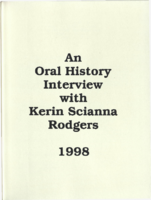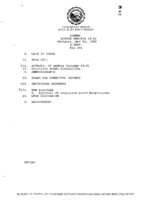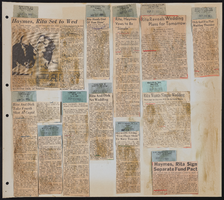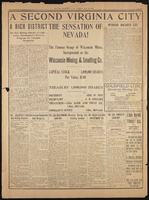Search the Special Collections and Archives Portal
Search Results

Jessica Hutchings oral history interview: transcript
Date
Archival Collection
Description
Oral history interview with Jessica Hutchings conducted by Barbara Tabach on March 21, 2018 for the Remembering 1 October Oral History Project. In this interview, Jessica Hutchings discusses her experience flying to Las Vegas, Nevada on the night of the October 1, 2017 mass shooting. She speaks of her flight's detour to Phoenix, Arizona, and her discovery of the shooting. Hutchings explains how Congregation Ner Tamid, where she is a cantor, contributed to the community healing after the tragedy, including their organization of vigils, a music fundraiser called "Vegas Strong in Song," and discussing the event with teenage Hebrew School students who had questions and concerns about the shooting.
Text

Transcript of interview with Tom Wright by Claytee White, February 14, 2005
Date
Archival Collection
Description
Dr. Tom Wright was born and grew up in Illinois. His father finished his PhD in Chicago and then taught at Illinois College in Jacksonville. His mother suffered from arthritis and was told to seek a warmer climate, so John Wright packed up his family and moved to Las Vegas. Tom was 14, ready for high school, and his two brothers were elementary school age. Tom attended Las Vegas High School, which was close to the Crestwood community where the family had purchased their first home. He remembers that UNLV had no buildings when his dad first started teaching there. Instead, he conducted class in high school classrooms and church Sunday school rooms. Dr. Wright started off at a community college as a Geology Major, but a class with Bud Poland convinced him that history was his passion. He transferred to Pomona to continue his bachelor's degree. He spent his junior year in Peru on a study-abroad program, and that experience made him a Latin Americanist. The information he gath
Text

Transcript of interview with Myra Berkovits by Barbara Tabach, August 21, 2014
Date
Archival Collection
Description
Interview with Myra Berkovits by Barbara Tabach on August 21, 2014. In this interview, Berkovits talks about growing up and starting her teaching career in Chicago. When she moves to Las Vegas, Berkovits eventually purchases a dining concierge business, but returned to teaching, and is now involved with the Sperling Kronberg Mack Holocaust Resource Center.
Myra Berkovits was born Myra Mosse in 1944 in Chicago, Illinois. She became an elementary school teacher in Chicago before moving to Las Vegas in 1980. Myra has made contributions to Las Vegas in the public and private sectors. She owned several businesses then returned to teaching, heading to the University of Nevada, Las Vegas (UNLV) to renew her teaching license and later received her master's degree. After a year of teaching in multicultural education, Myra was then in charge of the school district's homeless program, seeing its growth from serving 1,200 to 6,000 students. Myra's other passion was for Holocaust education and she became one of six interviewers in the city for the Shoah Foundation, documenting survivors' stories. One interviewee, David Berkovits, would later become her husband of fifteen years. Myra's own Holocaust education was aided by powerful trips to Israel and Poland. She used these experiences to develop and lead student-teacher conferences and classroom curriculum for the whole state. Myra still serves at the Education Specialist at the Holocaust Resource Center.
Text

Transcript of interview with Kerin Scianna Rodgers by Dennis McBride, February 24, 1998
Date
Archival Collection
Description
Kerin Rodgers owned a retail fashion store and modeling agency with a friend in Santa Monica, California. She came to Las Vegas in 1966 to work at The Broadway department store. She bought a home in the John S. Park Neighborhood in 1974. Popular radio personality; active in local and national politics.
Text

Transcipt of interview with John M. Beville by George Braver, March 11, 1981
Date
Archival Collection
Description
Text

Meeting minutes for Consolidated Student Senate University of Nevada, Las Vegas, May 11, 1989
Date
Archival Collection
Description
Text

Meeting minutes for Consolidated Student Senate, University of Nevada, Las Vegas, December 6, 1983
Date
Archival Collection
Description
Text

Transcript of interview with Ron Lawrence by Dennis McBride, June, July and August 1997
Date
Archival Collection
Description
Ron Lawrence is one of the busiest people in the gay community, so I want him to know how much I appreciate his reserving time for me so that I could complete this oral history interview. The importance of his work toward the well-being of the gay community in Las Vegas cannot be measured, and much of what he's accomplished and otherwise made possible will live long after he leaves us. With Ron's consent to this interview, our knowledge of Nevada's gay history is greatly enriched and our record preserved.
Text


